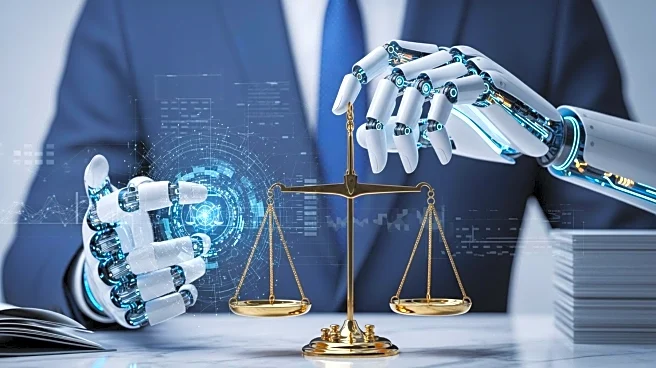What is the story about?
What's Happening?
The legal industry is increasingly adopting artificial intelligence (AI) tools to streamline various tasks, from legal research to administrative duties. According to the American Bar Association's 2025 Legal Industry Report, 31% of legal professionals now use generative AI for work-related tasks, although only 21% of firms have formally adopted the technology. Attorneys like Adam Shepherd and Michael Alexander are utilizing AI for tasks such as proofreading and initial drafting, while maintaining ethical standards by avoiding the input of confidential information into public AI tools. The use of AI is seen as a way to enhance efficiency and idea generation, but there are concerns about overreliance and the potential for AI-generated content to lack legal judgment.
Why It's Important?
The integration of AI in the legal field represents a significant shift in how legal professionals approach their work. By automating routine tasks, AI can reduce the time and cost associated with legal processes, potentially benefiting clients through faster and more accurate services. However, the ethical implications of AI use in law are complex, as attorneys must balance efficiency with the need for human oversight and judgment. The evolving role of AI in legal practice may also influence educational requirements for law students, who will need to develop fluency in AI tools to remain competitive in a transformed profession.
What's Next?
As AI continues to evolve, legal professionals may face increasing pressure to integrate these tools into their practice to meet client expectations for efficiency and accuracy. The American Bar Association's duty of technological competence may soon require attorneys to use AI when it measurably improves their work. Law firms are likely to invest in closed-source AI platforms to ensure confidentiality and risk management. Additionally, ongoing education and training in AI tools will be crucial for both current attorneys and law students to adapt to the changing landscape.
Beyond the Headlines
The use of AI in law raises broader questions about the future of legal ethics and the role of human judgment in legal practice. As AI tools become more sophisticated, they may begin to learn from outcomes and improve their ability to draft strong legal documents. This could lead to a reevaluation of what constitutes negligence in legal practice, with a potential shift towards an ethical obligation to use AI when it benefits clients. The balance between leveraging AI for convenience and maintaining human cognitive skills remains a topic of debate.

















